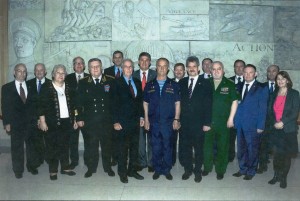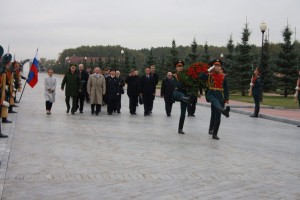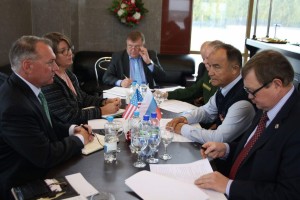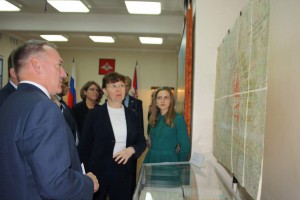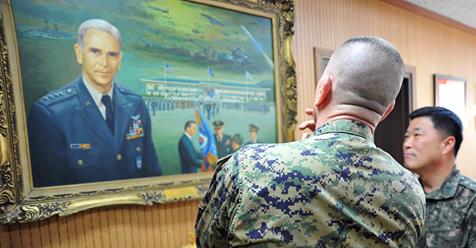|
Story by Henry Eastman, DPAA Historian DPAA through its Joint Commission Support Division (JCSD), and in support of the U.S-Russia Joint Commission on POW/MIAs (USRJC), conducts research, analysis and investigation in Russia on U.S. personnel missing from past wars. Much of this work deals with material collected from Russian archives, interviews with Soviet/Russian veterans, and field investigations. The USRJC was established in 1992 by Presidents George H.W. Bush and Boris Yeltsin as a forum through which both nations seek to determine the fates of their missing service personnel. Beginning in 1992, U.S. analysts have had access to many important Russian governmental archives for research on past conflicts including the Central Archives of the Ministry of Defense (TsAMO) in Podolsk, Russia—the largest military archive in Europe. However, a period of decreased cooperation started in 2006 when access to TsAMO was curtailed. Access was restored after U.S. President Obama and Russian President Medvedev officially reestablished the presidential status of the USRJC in July 2009 through an exchange of diplomatic notes. The Presidents also reaffirmed their commitment to strengthening bilateral cooperation on POW/MIA issues. Air Force General Robert H. “Doc” Foglesong (retired) has served as Chairman of the U.S. Side since April 2006. On the Russian Side, General-Colonel (retired) Valery A. Vostrotin was appointed the Chairman by President Putin in July 2014. The USRJC had met in plenary session 19 times between 1992 and 2005. This was followed by a period of 11 years where there were no plenary sessions. Therefore, despite the tensions in US-Russian relations, both sides recognized the need to hold a plenary meeting of the USRJC. Planning began in earnest after the initial meeting of Generals Foglesong and Vostrotin in Moscow in November 2015. The DPAA Director at that time, Mr. Michael Linnington, followed up with a visit to Moscow in February 2016 to discuss the forthcoming plenum. JCSD then hosted a Russian delegation for further planning in April, and, at long last, the 20th Plenum of the USRJC was held at the Pentagon Conference Center in May of this year. May 2016. 20th Plenum of the USRJC. From left to right: Dr. Tim Nenninger, Dr. James G. Connell Jr., Ms. Iolanta V. Mikhaylova, Congressman Tim Walz, Admiral Vladimir P. Komoedov, Mr. Michael Linnington, General Robert “Doc” Foglesong USAF (ret), Senator Joe Manchin, General-Colonel Valery A. Vostrotin (ret), Colonel (ret.) Andrey L. Taranov, General-Lieutenant Vasiliy S. Khristoforov, Colonel Yuriy V. Kargin, General-Colonel Aleksandr V. Kirilin, Mr. Tim Shea, Colonel (ret.) Nikolay I. Nikiforov, Colonel Eduard A. Paderin, Deputy Assistant Secretary of State Kathleen Kavalec During the 20th Plenum, both sides reaffirmed their willingness to assist the other side in obtaining access to information that will help clarify the fates of the missing and discussed a number of concrete issues. Over the nearly 25 years that the USRJC has been in existence, progress has been made. However, bureaucratic obstacles and security restrictions are still far too prevalent. Nonetheless, DPAA looks forward to building relationships and routinely updating families on steps being taken. In September 2016, Colonel Chris Forbes of DPAA’s Europe-Mediterranean operations, and his deputy, Heather Harris, traveled to Moscow and met with General Vostrotin to discuss expanded access in TsAMO to Vietnam War related documents, which remain difficult to obtain because they are largely still classified. They also discussed holding Technical Talks in Moscow in February or March 2017. At the technical talks we expect the Russian Side to provide us with Cyrillic maps from the Korean War-era, and an update on an archival search for information on ten Vietnam War-era SAM shoot downs and on the 6 November 1951 US Navy P2V shot down near Vladivostok during the Cold War. September 2016. Colonel Forbes, wearing beige, participates in a wreath laying ceremony at the Russian National Cemetery in honor of Russia’s Great Patriotic War Dead. September 2016. Colonel Chris Forbes and Heather Harris meet with General-Colonel Valery Vostrotin. In November 2016, Colonel Forbes traveled to Moscow once again where he met with USRJC Russian Side Deputy Chairman General-Colonel (retired) Alexander Kirilin and Executive Secretary Andrey Taranov to solidify the timeline forward and effect planning. He also visited the Anti-Air Defense Museum in Balashikha to view displays on the Cold War and Vietnam War shoot downs. September 2016. Colonel Forbes and Heather Harris at TsAMO. What’s Next? For each conflict, JCSD analysts have specific cases on which they have focused efforts to recover detailed information as well as general, broad requests that are intended to supply background information or new documents for analysis which have the potential to impact a large number of cases. As we refine our ability to obtain information about specific cases, the number of those we request Russian archival information for will grow. For more specific information related to efforts to obtain information for Vietnam, Korea, Cold War, and World War II cases, please visit the USRJC section of the DPAA website (http://www.dpaa.mil/Resources/Fact-Sheets/Article-View/Article/569603/us-russia-joint-commission-on-powmias/). For World War II files, many documents have been recently declassified, and there is a demand on the Russian government from the Russian people to complete the declassification process. This all plays to our favor, and JCSD plans to establish a regular research cycle at TsAMO for losses from World War II by the first half of 2017. The search for new information related to the Korean War, Cold War, and Vietnam War will be more difficult. JCSD is working diligently to improve archival access by actively and frequently meeting with our Russian counterparts. JCSD has an office at the U.S. Embassy in Moscow headed by Major James Harvey, who interacts daily with archival representatives and members of the Russian Side. In addition to the Technical Talks in Russia planned for February/March 2017, the USRJC plans on holding a second set of Technical Talks in Washington in June 2017 following the 48th annual meeting of the National League of POW/MIA Families. General Foglesong will be invited to report on the work of the USRJC at the National League of POW/MIA Families annual meeting as well as at the Korea/Cold War Annual Government Briefing in August 2017. The 21st Plenum of the USRJC is scheduled for Russia in November 2017. During the next six months, the Cold War Working Group plans to analyze the results of renewed Russian archival research with respect to the 6 November 1951 P2V shoot down, as well as prepare detailed correspondences on the other eight Cold War shoot downs requesting supplemental archival research. We will also renew efforts to locate and interview the A-20 aircraft crew which carried out search operations in the aftermath of the P2V shoot down, as well as the crew of the Border Guards cutters which surveyed the crash site. The Korean War Working Group is anxiously awaiting the promised release of Korean War-era maps used by the Soviet forces in North Korea and China. These maps will enable our analysts to pinpoint dozens of locations of downed US aircraft. This will prove invaluable should DPAA be permitted to conduct recovery operations in North Korea. JCSD also asked for access to other untapped collections of Korean War materials in TsAMO. The Vietnam War Working Group continues to seek answers from the Russians on the top 10 U.S. aircraft shoot down cases that were drawn from declassified 356 excerpts the Russians provided to the U.S. side in 2003. Specifically JCSD needs to have the Russians further research their multiple archives and further redact, declassify and release usable information surrounding these cases. JCSD will continue to investigate any report of US service personnel being transferred to the former Soviet Union. This issue was one of the key reasons that the USRJC was established. Though no conclusive proof of transfer has been uncovered, there is a significant amount of circumstantial evidence pointing to the possibility that transfers occurred. We must also not forget that the USRJC is a joint commission, and Russia also seeks to clarify the fate of its missing. JCSD liaises with the Russian support office that was established in 2015 at the Russian Embassy in Washington, D.C. Our Russian colleagues work primarily at the National Archives and Records Administration (NARA) in College Park, Maryland, searching for information on Soviet citizens who went missing during World War II. General Vostrotin has stated that the USRJC’s work is particularly important to Russians because one out of every twenty Russian families has a relative who is still considered missing in action. The new U.S. Ambassador to the Lao PDR Rena Bitter presented her credentials to President Bounnhang Vorachith on November 2 at the Presidential Palace. During her tenure as Ambassador, she is looking forward to advancing the Comprehensive Partnership between the Lao PDR and the United States that President Obama and President Vorachith unveiled in September. Ambassador Rena Bitter is a career Senior Foreign Service Officer with more than 20 years of experience in Washington and overseas. Most recently, Ambassador Bitter served as Consul General at the U.S. Consulate General in Ho Chi Minh City, Vietnam. Prior to that, she served as the Director of the State Department Operations Center, the Department’s 24/7 Briefing and Crisis Management Center. In Washington, she served on the Secretary of State’s Executive Staff and as a Special Assistant to Secretary Colin Powell. Her overseas tours include Amman, London, Mexico City and Bogota. Ambassador Bitter grew up in Dallas, Texas. AMG Comment: America has lost a national hero for whom, despite differences in latter years of his time as Special Envoy, I had great respect and admiration. He supported the POW/MIA accounting mission in ways very few people really knew and, fortunately for the League and all the POW/MIA families, League Senior Policy Advisor Richard T. Childress served under him at Ft. Carson, Colorado, and knew him well. Their friendship was at the center of President Reagan’s appointment as his POW/MIA Envoy, publicly announced in 1987. Childress and I were both an integral part of his initial trip to Hanoi referenced above, and all the plans and preparations that went into that endeavor. We will always owe a debt of gratitude to General Vessey and his devoted wife Avis. God Bless them, Ann
Ann Mills-Griffiths Chairman & CEO National League of POW/MIA Families http://www.nytimes.com/…/john-w-vessey-jr-who-was-chairman-…
2 Comments
4/19/2017 05:45:59 pm
Hi,
Reply
5/22/2018 10:17:49 pm
We have an ongoing suit against the CIA,FBI, State Department and the NIA. Demanding the release of classified information re Korean War unaccounted for. We have forced the production of sone 10,000 documents which they are releasing at the rate of 1000 per month. We today hired a PR agency to ask Pres Trump to add the Un accounted for to the Singapore Mtg.
Reply
Leave a Reply. |
|
COPYRIGHT © 2024 National League of Families of American Prisoners And Missing In S E Asia

